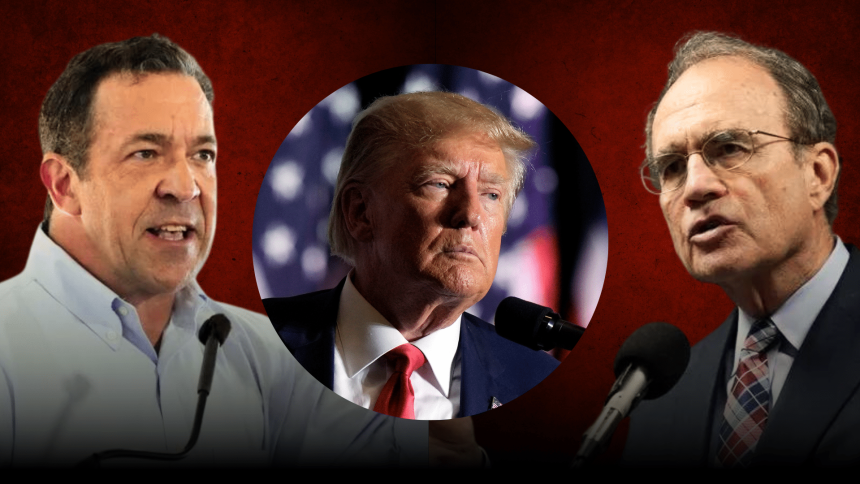In a nation scarred by internal strife and drowning in seemingly insurmountable division, this week marked a significant escalation in the legal battles surrounding former president Donald Trump.
Journalists gathered near the Fulton County Courthouse were not surprised when the news hit; they were poised, notebooks at the ready, just as they had been for weeks. In a late-night news conference Monday, Fulton County District Attorney Fani Willis pulled back the curtain on the indictment of Trump and a long list of associates over alleged criminal offenses related to the 2020 presidential election. The anticipation was palpable, akin to spectators in ancient Rome waiting for a gladiatorial contest – The Fulton County D.A. vs. Donald Trump.

Mr. Trump, one must assume, savors these moments with a seasoned politician’s glee. The legal wranglings, as unseemly as they might appear to some, allow him to keep a firm grip on the attention of the nation, commanding the airwaves and online forums with the deftness of a seasoned conductor leading an orchestra through a dark and complicated symphony. Willis’ determined pursuit of these charges had been broadcast far and wide, yet the actual unveiling of the indictments was a spectacle in political theater.
What this saga underscores, however, is not merely the divisive winds swirling around a single political figure, but the perilous state of a nation teetering on the brink of further division.
The indictments against Trump and his associates, and the ensuing political side-picking, have thrown into sharp focus the rift ensnaring American society. Reactions have ranged predictably from vitriolic defense of Trump by his staunch supporters to zealous persecution of his political movement by his determined opponents.
On one side, Trump’s loyal adherents see the indictments as a political vendetta cloaked in the robes of justice. On the other, Trump’s foes march forward, swords drawn, demanding accountability. These developments will cast a long shadow on the integrity of the American judiciary system and our once-venerated democratic institutions. District Attorney Willis’ decision to seek criminal convictions against political operators by charging them as an organized criminal enterprise will reverberate for generations.
The possibility of an unprecedented legal battle against a likely Republican nominee actively running for reelection sends tremors through the foundations of the nation. It’s a Shakespearean plot filled with twists and turns, woven with intrigue, and its implications reach into the very core of American governance. But we must also pause and turn our eyes beyond the immediate breaking news alerts to understand the greater tragedy that is unfolding. This division is not merely a political skirmish; it is, in its essence, a civil war of ideas and beliefs.
On the right, there’s an entrenched perception of a government waging battle against its citizens. On the left, there’s an almost gleeful engagement with chaos, as if criminal prosecutions were a spectator sport. The result? The nation diminishes, weakened by internal strife, poisoned by polarization, and shackled by the chains of ideological battles dividing friends, families, and communities.
These are not mere political woes. They are American ailments, festering sores in need of American remedies. In the unending noise of the 24-hour news cycle and the relentless bombardment of political advertisements, the choices may appear bleak. Our era might be remembered as a time when the noble virtues of statesmanship became liabilities and compromise — a sin rather than a virtue.
The brighter times in our history all share a common theme – the most enduring progress was achieved when opposing sides found common ground, not in bloody battles but in thoughtful discourse. This concept, as simple and noble as it may be, seems lost in the current political battleground, like a treasure buried and long forgotten. The journey towards unity begins with each citizen recognizing that “A house divided against itself cannot stand,” as Lincoln wisely declared. The great milestones of America’s past were forged in unity around common interests. Unity has always been the catalyst for positive change and the bedrock on which great nations thrive – we know that – but we live in an era when it’s become politically unfashionable, a relic of a bygone age.
As we stand before the precipice, eyes wide and hearts heavy, we must decide whether to plunge into deeper division or rise above our differences. The path we choose will shape not just the political landscape but the very soul of the nation in the 21st Century. It is our collective choice and our shared responsibility. And the stakes? They are so much higher than we seem to realize.
Last week, Mississippi conducted its state primaries, determining the political landscape for a myriad of statewide, legislative, and county offices. The marquee contest – a showdown between Lieutenant Governor Delbert Hosemann and perennial challenger Chris McDaniel – has been viewed as a microcosm of the broader ideological battle that will soon shape the GOP presidential primaries. In the end, McDaniel’s aggressive campaign, positioning himself to the right of an already staunch conservative in Hosemann, fell well short. Hosemann glided to victory, clinching the primary win and eliminating the need for a risky runoff.
This Mississippi race sets the stage for the next much-anticipated event on the political calendar: the first GOP presidential debate, scheduled for next Wednesday night in Milwaukee. As a key precursor to the 2024 presidential primaries, this debate is particularly significant. All eyes will be on the presence — or absence — of Trump, a factor that promises to be the focal point of the evening, along with the inevitable questions the GOP candidates will field about Trump. As the debate unfolds, Americans will commence the vital process of deciding who will lead the Republican Party into the 2024 election, a decision that will surely reverberate across the nation’s political landscape.
Here’s a nod toward casting our ballots not on the colors of political partisanship, but on a candidate’s deeper affiliation to nobler ideals, to values that transcend the muck of partisanship. As I watch upcoming debates, I’ll be listening not for rehearsed soundbites and partisan talking points, but for authenticity and pragmatism, asking myself whether candidates are trading in the tarnished currency of division or making genuine appeals to shared progress.
And here’s the startling reality: polls suggest I’m not alone in this sentiment. Both leading candidates for their party’s nomination – Democrat Joe Biden and Republican Donald Trump – find themselves tethered to 40 percent or lower approval ratings, languishing in a valley of national discontent. The problem is, both are also the clear favorites to be their party’s standard-bearers, with potential challengers on both sides facing almost insurmountable odds of beating them. This is the nature of our flawed primary system: a candidate who garners 40 percent of a crowded presidential primary vote – with 6 out of 10 voters of their own party choosing someone else – can easily cruise to their party’s nomination.
And unless the 2024 election is graced with a viable third-party candidate – a phenomenon as rare in American history as a cold Mississippi afternoon in August – Biden and Trump will likely be the only real choices on that fateful Election Day in 2024.
This suggests a reality that strikes at the very heart of our national ailment – it’s not the American people who are broken, weary though we may be; it’s our political infrastructure that’s fractured, creaking under the weight of its own contradictions.
A reckoning awaits us. We are not merely spectators in a political drama but active participants in a defining moment of our nation’s history. The choice we face is clear: continue down a path of division and political war, allowing bitterness and strife to erode the very foundations of our democracy, or rise above partisanship and seek the higher ground of unity, compromise, and shared values.
May we find the wisdom and courage to make the right choices in the upcoming primaries, for the sake of the generations that will inherit the consequences of our actions today. And may we realize that we do, in fact, have a choice.
The views expressed by contributors are their own and not the views of SuperTalk Mississippi Media.







